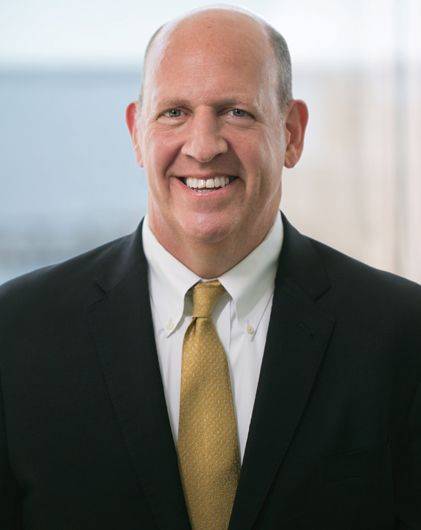Access to Trailblazers: Reed Russell Pulls From His Military Service to Lead with an Open-Minded Approach
Reed Russell says his time as a major in Army National Guard gave him invaluable tools he’s used to build a successful law practice. The characteristics he learned to harness during his service made a lasting impression on his own life and how he manages his role as the practice coordinator for Phelps’ regional Labor & Employment practice.
Reed’s military career started in Wake Forest’s ROTC scholarship program. Military service was an obvious choice for him, coming from a family that served in the military for generations, and an ROTC scholarship helped him pay for school. He remained in the Army reserve and then the National Guard while pursuing his legal career. This meant long weekends serving with the D.C. National Guard after already-long weeks advising clients. But Reed made it work, fulfilling his commitments to his firm and his country while also starting a family. Then, in 2005, when he was working on the biggest case of his career, he got the call that he would be deployed to Iraq.
He spent a year in Iraq as a member of an advisory team embedded with Iraqi forces. This presented unique challenges and opportunities for him to grow. The soldiers in his American unit came from every walk of life, bringing different backgrounds, experiences and personalities to a high-stress and high-accountability environment. Reed quickly learned to understand each of his fellow soldiers, building common ground and trust so they could keep each other safe and do their jobs successfully. This extended even further to working and often living with the Iraqi soldiers. His unit needed to understand the Iraqis’ culture and points of view, in order to overcome their suspicions and work together toward their common goals. Understanding a completely different value structure in a high-stress situation often required extraordinary patience when not being patient had potentially catastrophic consequences.
While Reed was deployed, he said his firm, Akin Gump, was very supportive and understanding, checking on him and his family throughout his deployment. But his situation as a practicing attorney and active military member was rare, even for a D.C. firm. There were only a few other military members at his firm. This is still common among most large law firms, where less than 2% of attorneys are veterans.
After serving in Iraq, Reed stepped back from his military service to focus on his legal career, eventually being appointed to work as Legal Counsel for the EEOC. The relationship skills he learned during his service helped him make great strides at the agency, finding common ground and understanding with his EEOC colleagues, who also had quite different perspectives from a private practitioner representing management. Reed says one of the keys to this approach is to start with respect. Assume that those you’re working with have good intentions, just like you. From there, being patient and open-minded can bring others on board, and even if you don’t always agree, you can still work together to get things done.
Lessons Reed Learned From His Service That He Shares With Businesses
When counseling on labor and employment issues, Reed still draws on lessons learned in his military experience. Reed’s clients often have to work with investigators from government agencies and opposing counsel. This can involve a lot of tension and different personalities. But Reed helps companies navigate these and form relationships by helping them understand who they’re dealing with, learn about their personalities and find out what they value. The most important thing to remember when approaching these situations, Reed says, is the client’s goal and how to achieve it, whether that be quiet resolution, correcting a problem quickly and with minimal fanfare and collateral impact, or litigating a key business practice. If you can stay patient, measured, and focused on your client’s goal, all parties have a much better chance of success.
This is just one of the benefits Reed says that he and his fellow veterans bring to the workplace. When stress is high, they have the skills to handle it. All service members have experience in the military’s culture of accountability. They are trained on the primacy of mission accomplishment and are hard-wired to focus on meeting expectations with a “can do” attitude. When recruiting diverse candidates, including veterans, Reed advises companies to focus on excellence. Bring in candidates and expect them to work toward your standard of excellence. Veterans will recognize and appreciate that and work toward meeting it.
What Young Lawyers Can Bring to the Table
To make yourself an excellent candidate, Reed shares this advice with young lawyers:
- Start with mutual respect. Approach every new encounter with transparency. Entering a new situation with a clear mind and vision lends to mutual respect and will develop relationships and start projects off on the right foot.
- Treat everyone you’re working for like a client. As a new lawyer, you may be a few steps removed from clients. In these cases, treat the person who’s assigning the work, whether it’s a partner or another more senior associate, like your client, and give them the product you would if you had hung out your own shingle.
- Be accountable for your actions and your work product. When you’re given an assignment, no one is going to take care of it for you if you don’t do it correctly. Getting it done on time and correctly is what will make you someone that lawyers and clients want to work with.
We thank Reed—and all of our veterans—for not only their service to our country, but also for continuing to share their wisdom and experience to improve their communities and civilian professions.


